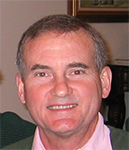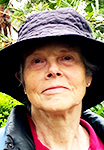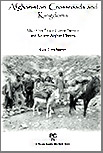Review | AFGHANISTAN: CROSSROADS AND KINGDOMS by Guy Toby Marion
by Guy Toby Marion (Afghanistan 1971-75)
Peace Corps Books
January 2024
280 pages
$21.95 (Paperback); $8.95 (Kindle)
Reviewed by Robin Varnum (Afghanistan 1971-73)
• • •
In 1974, after serving for two years as a Peace Corps volunteer in Afghanistan, Guy Toby Marion (known to his friends as Toby), returned to New York on home leave and was greeted by a family friend, who said, “welcome to civilization.” Toby smiled politely, but he thought privately that, “despite its poverty, Afghanistan was cultured and civilized.”

Toby Marion about 15 years ago!
Toby’s Afghanistan: Crossroads and Kingdoms (Peace Corps Writers, 2024) displays its author’s deep appreciation of Afghanistan’s culture, Islamic religion, poetry, and history. Sadly, that history has often been violent, since as Toby points out, “from ancient times Afghanistan has been an historical crossroads, seeing many wars and changes of empire.”
When Toby arrived in Afghanistan in 1971, he was 22 years old and had an MS in Chemical Engineering Practice. He trained in Kabul as a Science Teacher Supervisor and was warned that the educational system in Afghanistan was largely based on rote memorization and that few science teachers were qualified to teach their assigned subjects.
Upon completion of his training, Toby was assigned to work with two Afghan counterparts in Kapisa, a mountainous province north of Kabul. Together, the three supervisors visited provincial schools, worked with math and science teachers, performed science experiments, distributed books and supplies, and instructed teachers in the use of these materials. One of Toby’s especially impressive achievements was to write, in the Farsi language, a 22-page chemistry guide for teachers.
During his two years in Kapisa, Toby lived in a house enclosed by thick, 18-foot-high adobe walls. He says the experience was in some ways like living in the Middle Ages. His house had no electricity or plumbing, but it had a flat roof, and in the warmer months, Toby slept on his roof under a canopy of brilliant stars. He remembers disputing with his brother, a Peace Corps volunteer in Guatemala, over which was having the more rugged experience. Toby’s brother said his Guatemalan community’s only source of water was a pipe that ran alongside the main road. In mock astonishment, Toby replied, “You mean you had water in pipes?” Water in Afghanistan came from open irrigation and drainage ditches.
In 1973, during Toby’s second year in Kapisa, Mohammad Daoud Khan overthrew his cousin, King Zahir Shah, in an almost bloodless coup. Toby cautiously kept a low profile, but the coup did not prevent him from signing up for a third year with the Peace Corps.
He moved to Kabul where for three semesters, he taught chemistry and thermodynamics in the Faculty of Engineering at Kabul University. The job was challenging, but instruction was in English, and many of Toby’s colleagues had been trained in America.
In August of 1974, Toby set off with three university colleagues, two of whom were Afghan, on what Toby describes as “one of the greatest adventures of my time in country.” The four young men hiked for 26 days across the rugged mountains of Central Afghanistan. They depended for lodging on local hospitality and for food upon whatever was available along their route. Toby says he and his companions “recognized that we were lucky to be in a country that was peaceful and respected authority.” They did not know that “the coup d’etat of the previous year had set in motion changes driven by idealogues, revolutionaries and the USSR that would lead to national disaster.”
Throughout his book, Toby skillfully interweaves his personal story with the long and troubled history of his host nation. He notes that since 1839, the Afghans have outlasted all invaders, including the British, Russians and Americans. In 1978, only three years after Toby left Afghanistan, the Peace Corps pulled out of the country.
In 2001, the United States and its allies invaded Afghanistan and became embroiled in what was to be our nation’s longest war. Toby says that one of his goals in publishing his memoir has been to provide readers “with insights into Afghanistan and America’s role in its recent history.” He concludes by hoping the US will engage with the Islamic government of Afghanistan in a mutually beneficial quest for peace and the redevelopment of the war-torn nation.
• • •
Biography of Reviewer

Robin Vernum
From 1971-1973, Robin Varnum served with the Peace Corps in Afghanistan. During those two years, she taught English at a girl’s school in Ghazni, southwest of Kabul. She has recounted her Peace Corps experience in Afghanistan at a Time of Peace (Peace Corps Writers, 2021). She is married to Juris Zagarins, a fellow RPCV, who was one of Toby Marion’s companions on the 26-day trek* through the mountains of central Afghanistan.
*See “Photos from Afghanistan.”

Robin,
Thank you for posting this excellent, descriptive review of Toby’s book, Afghanistan at the Crossroads. I have almost finished reading it and can add that I found Toby’s descriptions resonated with my own experiences as a Peace Corps Volunteer in Afghanistan during the same three years. Among his many accomplishments, Toby’s acquisition of Farsi proficiency, including reading the great poets, was truly impressive.
Let me add that I also greatly enjoyed reading your book, Afghanistan at a Time of Peace.
I appreciate that both of you shared personal and difficult experiences with remarkable candor.
Thank you!
Bonnie Thie Cowart
Well done Robin.
This is an excellent review and a timely book! I especially like the comparison with his brother’s experience in Guatemala, as I was there about the same time Toby was in Afghanistan. And I soon learned, like Toby–although the circumstances were challenging and the poverty all pervasive–the Mayan population represented a long history and impressive culture, something I focus on in my upcoming book.
What I like the most is that Toby’s book not only reflects on the past problems t but also provides insights into Afghanistan’s challenges and opportunities, which are all too often ignored.
Welly done–Robin & Toby